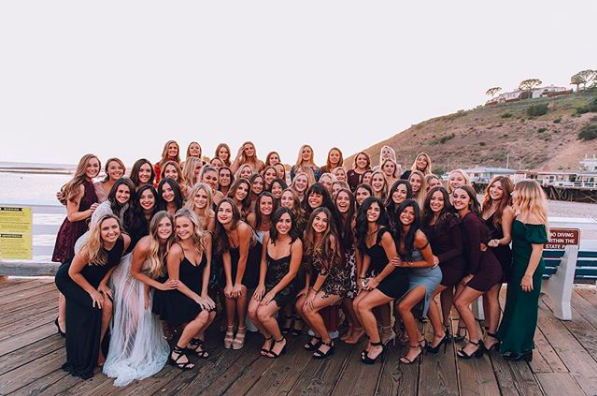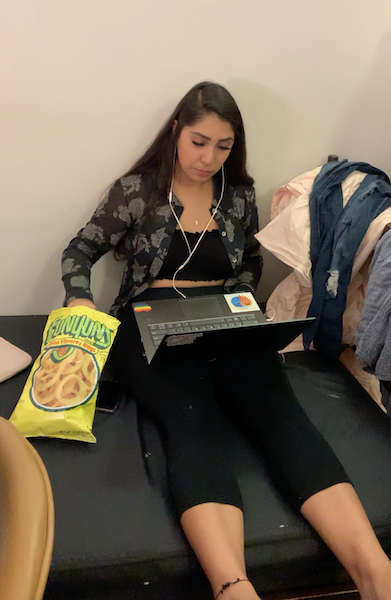
In 2022, women are leveling out the playing field when it comes to speaking up.
Women are the majority at Pepperdine at 58%, according to the Office of Institutional Effectiveness. But a Pepp Post survey of 52 students found that men find it easier to speak up in various situations. Factors like familial hierarchy, religious upbringing and relationship roles can influence how female students use their voices in everyday life.
“Girls are vulnerable,” Management Professor Constance James said. “They start with loud voices full of ideas, stories and promises, only to have their voices snuffed out with prejudice, bias and violence. In homes where girls are empowered and seen, they find their voices.”
Interviews with three students and two female faculty leaders illustrated how their backgrounds and position have played a role in their willingness to speak up, speak out and inspire leadership.
Situations that provoke speaking up: Students’ responses
The poll asked students to indicate how comfortable they feel speaking up in certain settings and how they would respond in certain situations.
Overall, males reported that they were more comfortable sharing their opinions, thoughts and feelings in various scenarios.
On a scale of one to five, roughly 38% of males reported a ‘5,’ the highest comfortability while speaking up and sharing opinions in class, whereas 50% of females reported a ‘3,’ a moderate comfortability for sharing opinions in class.
Both men and women were generally comfortable sharing their emotions with their friends.
More women than men indicated they would voice their disagreements with their parents.
Both male and female students reported that they would email or speak with their professor about an incorrect grade, but roughly 10% of females reported that they would accept the wrong grade.
In a situation where a speaker of high status delivers a speech that is inappropriate or harmful to the students, 40% of females reported that they would first compliment the speech giver first before expressing disagreement, while 47% of male students would just express disagreement. But slightly more women than men said they would more forcefully describe the speech as harmful.
Hindering aspects of speaking up
Sarah Stone Watt, the divisional dean of Communication who specializes in gender studies and rhetoric, said communication styles can develop in relation to the situation, race, gender and perceived authority. Sometimes one may not perceive themselves to have power in a given space.
Stone Watt explained that combinations of race and gender can also set a tone for what’s ‘normal.’
“When you come from a group that is not the norm of power,” Stone Watt said, “you’re aware of that when you speak.”
Stone Watt sees the power dynamics directly at play as a professor.
“When I’m in a classroom, I’m the person in power,” Stone Watt said. “That’s a privilege that I have.”
There are many reasons why women do not speak up, James said. This could include a lack of opportunities, concern for what others think about them, male-dominated cultures, church models that have male-dominated cultures and practices, paternalistic models of leadership and so forth.
“I’m sure there are many more reasons,” James said. “But these are some that I have seen.”
Up-and-coming women in leadership are still learning to use their voices
Naya Edwards, a senior sports medicine major, is president of the Black Student Alliance and the financial secretary and historian of the AKA sorority. She said her communication style depends on the setting.
“In a business class where the majority were guys, I was the only Black girl in class, I forced myself to be more aggressive,” Edwards said. “I made sure that when I had a presentation that I was captivating and intentional with what I did and how I looked, making sure I was always on ps and qs so that I send the message that if I’m speaking, you’re gonna listen and hear.”
Sophomore psychology major Isabella Mullin, director of development for the Pepperdine KWVS Radio station, said she struggled with standing up for herself and was frustrated when she was misunderstood.
“Last year, I was playing for the beach volleyball team and I felt like I wasn’t being valued as a person and as a player on the team,” Mullin said. “But voicing it out to my coaches was not there, I just kept it to myself and tried to be happy even when I wasn’t.”
Mullin talked to her parents repeatedly about her concerns with the sport. Though it took some convincing, she said her parents finally listened, and now she doesn’t participate in the beach volleyball team.
Priscilla Maldonado, a sophomore psychology major with a women’s and gender studies minor, said she experienced the power dynamics of organizations at her job this past summer where her manager would make sexist comments and touch the female employees on their shoulders.
“I just never said anything because I needed the job,” Maldonado said. “I needed the money, and it also didn’t cross major boundaries, so I just like dealt with it, you know.”
Maldonado said she is careful with what she says in a classroom setting.
“But in classes like religion, when I hear someone say something like crazy, l normally don’t say anything,” Maldonado said. “You never know who might harm you for saying things they don’t agree with. Men literally kill women just for like disagreeing with them, so that’s what scares me.”
Established women in leadership struggle too
When she first began teaching, Stone Watt said she was closer in age to her students. This made some students feel inclined to try to negotiate grades and course content with her.
“When I came to Pepperdine, it became very obvious that when I went by my first name, the level of respect decreased dramatically, which wasn’t always true for my male colleagues,” Stone Watt said. “So now I use my formal title consistently not because I want to brag on it, but because the initial level of respect and what people feel comfortable asking me to do is very different when they encounter the title versus my first name.”
When James came to Pepperdine, she understood her role as a woman in leadership.
“When I became what we call ‘divisional dean,’ I knew that some of the faculty, particularly some male faculty, were not supportive of me,” James said. “There was a lot to untangle here because I am both Black and female.”
Despite her team’s unsupportive nature, James said she was persistent in her efforts.
“I learned much about how love and loving your enemies work in a work environment,” James said.“The result was an immediate and massive productivity increase, resulting in being reaccredited by a prestigious agency, something we would not have been able to do before I started.”
Family upbringing influences ability to speak up
Household practices can set the foundation for how individuals refrain from or decide to speak up.
James said an unsupportive family member at least partially helped her succeed in education and leadership.
“I knew I wanted to get an MBA when I was 16,” James said. “No women that we knew had an MBA. My uncle told me that I would not get an ’MBA,’ but that I would get an ‘MRS’ degree. I got my MBA from one of the two best programs in the country when I was 22 years old.”
James received her MBA from the University of Michigan–Ann Arbor.
“The point of this story is that adults have powerful voices and some children will believe what they say,” James said. “Other children will know instinctively that the adult is wrong. I was seething when my uncle told me that I wouldn’t do it. In some ways, it made me resolve that I would. I am grateful I did it.”
For Edwards, family culture set the tone for how she speaks up.
“In my culture, it’s elders that you have the most respect for,” Edwards said. “Even if they’re wrong, they’re right, because they’re older, and that’s frustrating.”
Edwards mentioned a strong-minded figure in her life – her mother.
“We don’t really argue,” Edwards said. “It’s kind of whatever she says.”
Mullin also grew up with a strong female role model and attributed knowing her worth to her strong matriarchal household.
Maldonado stressed the importance of equal roles in the family.
“My parents both had equal roles in everything,” Maldonado said. “They taught me to speak up and use my voice and they would get mad at me if I didn’t. It’s definitely why for the most part I speak up today and I’m really glad that they taught me that.”
The poll found that most students at Pepperdine have both parents in their households. About 83% of female students and 67% of male students at Pepperdine had both parents in their household growing up.
Many reported that their mothers stayed at home while their fathers worked full-time. Roughly 77% of females and 62% of males said their fathers worked full-time.
Religious factors that help or hinder speaking up
For some students, their religious upbringing is the larger factor in whether they speak up.
The Roman Catholic Church and many Protestant churches limit the roles of women in church leadership and establish a culture of silencing women’s voices, Michael Welch wrote in the JSTOR journals in 1982.
Welch wrote that internal fear of women creates a patriarchal culture system designed to reserve power positions for men. If faith is a foundational part of the self, then women are likely to experience difficulty with leadership roles in all other aspects of their lives.
In another instance, complementarian households are religiously structured households that assign roles or duties that differ between men and women.
“It means that they’re not actually complementing one another,” Stone Watt said. “They’re just trying to fit these stereotype roles, which can be pressuring.”
Further poll data examined the religious upbringing of students in regard to positions of authority.
Most students reported their family household did not follow a patriarchal model with their father as the head, but 29% of males and 16% of females said their households did.
The majority of students reported that their current religion does not limit women’s roles in any way, but some students still see this in their congregations.
The students in this survey reported a range of religious backgrounds.
James, who is a member of the Churches of Christ, sees how religious contexts have limited the roles of women.
“I have seen people misuse scripture to oppress people,” James said. “Once I read the context of those scriptures, I knew that those men were not men of God. I pray that people stop misusing the Bible. I also pray for those women.”
Edwards follows her household’s faith –Baptist.
“Church is sometimes a place where I feel my gender plays a role in how I act,” Edwards said. “We’re taught in Christianity that men are the leaders, and I feel like there were times when something just didn’t sit right with me. I kind of had to learn not to just take it.”
Edwards found outlets to formulate what it means to be a Black Christian woman.
“I had mentors that showed me that women aren’t second-class citizens,” Edwards said. “That’s not how God sees us, even if there are descriptions about women being silent in church in a worship setting, there’s still so much we can do to contribute.”
Mullin said she is frustrated with her Roman Catholic faith.
“I feel like I didn’t really think about the things I was doing,” Mullin said. “I kind of just went with the flow.”
College has allowed Mullin to do things her way.
Maldonado has left behind her Roman Catholic upbringing.
“There were definitely some iffy things that the church taught,” Maldonado said. “I don’t associate with that institution anymore, now my family and I all just have our own personal relationships with God.”
Steps for progress, hope for the future
Edwards is already a leader in many aspects. She said she was able to see physicians, dentists, and providers who looked like her, which influenced her ability to connect with her potential.
“Not every woman wants to be front and center running things, but it’s nice to see it to know that you can do it,” Edwards said. “People need to live vicariously through that person to feel a collective success, help each other and show each other how to navigate those spaces that may have not been open for us before.”
Edwards has high hopes for her future and wants to make a lasting impact for generations after her.
“I wanna be the first something, but I don’t want to be last,” Edwards said. “I should be the person that makes the way for someone that looks like me or wants to be like me and help them get there easier so that they won’t have to struggle as much as I did or as the person before me did.”
Mullin aspires to be a leader that is a friend to all.
“Throughout my life, seeing powerful women doing their thing is inspiring for me,” Mullin said. “To hear them say what they need to say without thinking and proceed to be powerful is everything.”
Maldonado said she believes that women and other communities add value to leadership.
“Leadership positions shape a lot of the world in different ways and if you only get the male perspective, then you’re not seeing the bigger picture,” Maldonado said. “People in the LGBTQ+ community should have more representation as well so that we can have a fuller world view in every sense.”
Jordyn Pruitt completed the reporting for this story in Jour 241 under the supervision of Dr. Christina Littlefield and Dr. Theresa de los Santos. Dr. Littlefield supervised the web version of the story.



